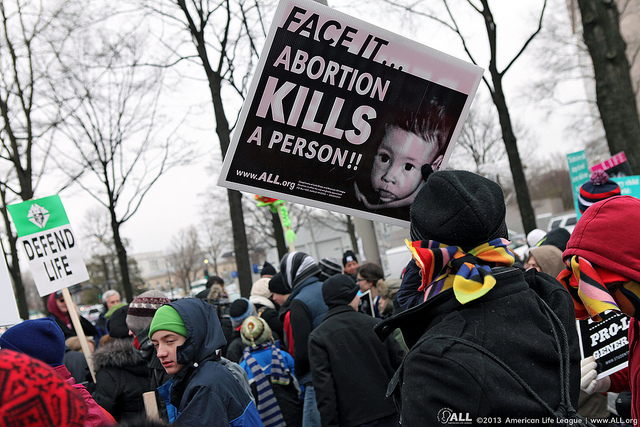
Why Jesus Doesn’t Care If You Get An Abortion
- By Derek Welch --
- 02 May 2018 --

A Vague Biblical Interpretation Shouldn’t Lead To Decreasing Women’s Rights
Ever done any cloud watching with friends? Your buddy Steve is one hundred percent sure that cloud looks like a raccoon. You think Steve is insane; the cloud is clearly the head of Supreme Court Justice Ruth Bader Ginsberg. Even after a hearty discussion, you know what happens? No one dies. Hopefully. The amount of cloud-related homicides has generally not been given serious statistical analysis. Yet, the United States is dooming tens of thousands of women to potentially life-threatening conditions because of a conflict of interpretation. But this is not about cloud shapes; it is about the Bible and abortion.
Why Jesus Doesn’t Care If You Get An Abortion[/tweetthis]
One of the major arguments against abortion is on religious grounds. When Iowa passed the most restrictive abortion laws in the country many of the state senators invoked their Christian faith. When Texas and Mississippi severely restricted abortion clinics Christian groups enthusiastically applauded.
Warning: video has adult themes and language
Why? Because abortion is never directly restricted in the Bible. While there are some references to it in the Old Testament, the New Testament never mentions it. Jesus, while he mentioned the importance of helping the poor over a dozen times, never interrupted the Sermon on the Mount to say “and before I forget, don’t get abortions.” It wasn’t like abortions were not around. The medical procedure goes back thousands of years to ancient Greece and Rome. Jesus knew they existed. In fact, every person quoted in the Bible would have known they existed. But none of them gave even a single line to explicitly condemn it.
So why are Christians opposed? This is where interpretation comes in.
First, the Ten Commandments say “thou shall not kill.” Then anti-abortion Christians point to passages that demonstrate that a fetus is a life: “breathed into his nostrils the breath of life and man became a living being.” Or that God has a personal relationship with fetuses, indicating life: “Before I formed you in the womb I knew you, and before you were born I consecrated you; I appointed you a prophet to the nations.” Or that the Bible references sin while in the womb, and having sin requires you to be a person. Others look to sections that support giving life to children: “This day I call heaven and earth as witnesses against you that I have set before you life and death, blessings and curses. Now choose life, so that you and your children may live and that you may love the Lord your God, listen to His voice, and hold fast to Him.”
But the problem is that God and the womb are from Psalms, which some biblical scholars have said is a series of poetic expressions that should not be interpreted literally. Or that the concept of what a child is was also never explicitly defined. Early Christian texts added abortion as a banned activity but included it with things like perjury without giving enough scriptural support.
This is the problem of interpretation; it depends on which lens you use. For some, this could mean that any contraception should be banned. For others, it means that abortion should be banned when the fetus becomes a human (which matches the Iowa law), or it could be a complete ban. It is inconsistent.
This matches the history of abortion in the United States. When abortion was banned in the 19th century it was not religious groups, but doctors who were pushing for it. Doctors at the time were unhappy with the number of non-medical professionals performing the procedure and wanted to bring it under their control. There was also an underlying white supremacist justification. Men argued that most of the women receiving abortions were white Protestant women from upper-class families, while the “vile hordes” of immigrants were entering America and having large families. It became a public battle over which majority would control America.
The issue becomes solidified as a religious issue after the election of Lyndon Johnson in 1964. Attempting to find a way to unite Protestants and Catholics to vote for politically conservative candidates required a rallying matter. And it had to match the public appetite. No longer could conservatives use opposition to civil rights; the country was becoming unified against segregation. The new issue became abortion. This is where much of the rhetoric that would become the foundation for modern Christian opposition in America was created. The 1973 Roe v. Wade decision that legalized abortion helped fuel the fire.
There are real-world consequences to the ending of abortion by using biblical interpretation. Historical studies have estimated that over 800,000 illegal abortions occurred before Roe v. Wade. Thousands of women died every year from these dangerous procedures. Children were born that were not loved or wanted. The book Freakonomics argued that abortion lowered crime rates in cities because the number of children that were likely to be raised in poverty or conditions that bred crime were drastically reduced.
Figuring out how to apply the Bible to the modern world inevitably becomes more difficult. But interpretations should be between theologians and effect what is said in church, not in a doctor’s office. Christians cannot wholeheartedly believe they are following the Bible when opposing abortion. They are just supporting a specific interpretation. There has to be an acknowledgment that multiple viewpoints exist. This means there is some doubt on what the “true meaning” is.


















